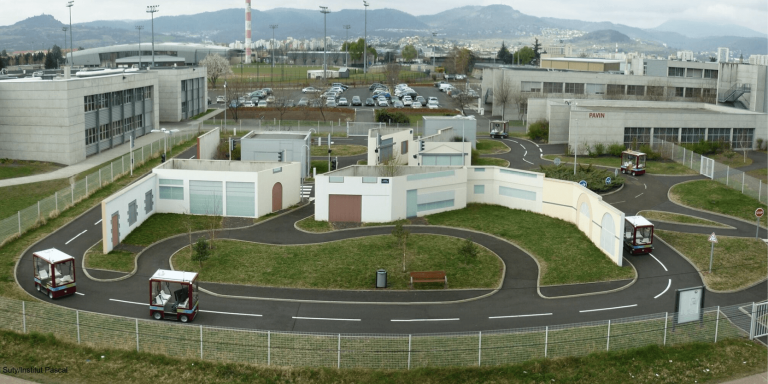
AI4MobLab, is a shared laboratory born from the association between the Pascal Institute and the two industrialists logiroad and SHERPA Engineering. It aims to couple autonomous vehicle control systems with techniques for analyzing the state of the road network in order to respond to the major challenges of tomorrow, in particular the carbon footprint of the mobility sector, the main emitter of CO2, as well as the number of deaths on the roads.
The Pascal Institute, UMR 6602, is a mixed unit of research and interdisciplinary training with 400 people, placed under the supervision of the University Clermont Auvergne (UCA), the CNRS, the CHU of Clermont ensuring the secondary supervision. The institute is a member of Clermont Auvergne INP, which includes three engineering schools: ISIMA, POLYTECH Clermont and SIGMA Clermont.
The Institut Pascal was born from the successive merger (2012, 2017, 2021) of seven laboratories covering the disciplines of Engineering and Systems Sciences of the Clermont site: Process Engineering, Mechanics, Robotics, Physics of Information Sciences, Health.
It develops knowledge and technologies contributing to three fields of application: the factory (including ecosystems), transport and the hospital of the future.
A laboratory based on years of collaboration
Sherpa, an expert company in embedded systems engineering, has been collaborating with the Pascal Institute since 2016 around the themes of intelligent mobility, in order to consolidate its ADAS(Advanced Driver Assistance Systems) product and service offer that it markets to major automotive and transport accounts such as Renault, Stellantis, RATP, Navya, Denso…
For its part, Logiroad develops software solutions (analysis of data collected by on-board sensors) to diagnose road conditions and recommend work to managers, as part of a preventive maintenance approach. The company has been working with the Pascal Institute for 15 years on AI and multi-sensory perception issues for clean and innovative mobility.
The AI4MobLab joint laboratory
A dozen people from the three partners are working in the shared laboratory launched last September for a period of three years, on the Institut Pascal site.
Its objective is to develop autonomous vehicle control systems capable of using data provided by on-board sensors, as well as data from communication with other vehicles and from a road network monitoring system. AI technologies will be used to analyze and merge this data, thus contributing to decision making.
Scientists at the Institut Pascal have developed expertise in the field of autonomous vehicles on closed sites, in particular those of the ISPR axis, which is an active member of the Labex IMobS3 (Innovative Mobility: Smart and Sustainable Solutions). This collaboration within the AI4MobLab laboratory is an opportunity to open their field of research towards autonomous vehicles for the road network. The solutions developed by AI4MobLab will be tested on the Pavin platform (Auvergne Platform for Intelligent Vehicles), an experimental mini-city managed by the Pascal Institute, for the development of automatic vehicles in a realistic urban environment.
Translated from IA et véhicules autonomes : focus sur le LabCom AI4MOBLAB









